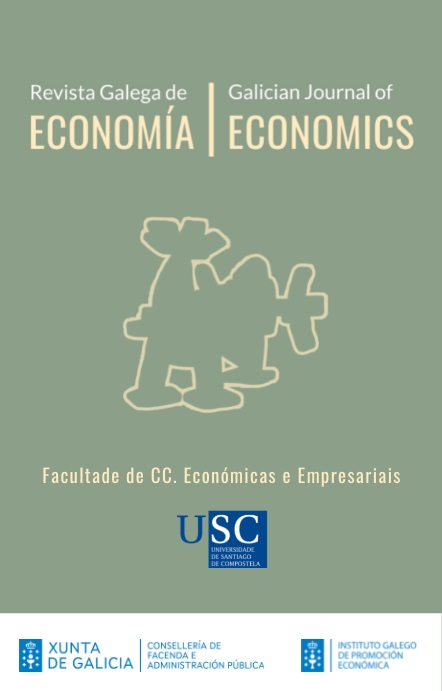Evolución da política galega de innovación: de cero á especialización intelixente
Contido principal do artigo
Resumo
O obxectivo deste artigo é explicar os cambios acontecidos na política galega de innovación durante as dúas últimas décadas. Observamos que esta política xurdiu como unha política de innovación, e non só de ciencia e tecnoloxía, a finais dos anos 90. En certo modo, existe un patrón de continuidade ata o 2009 en que os cambios viñeron determinados en boa medida por procesos de imitación e aprendizaxe, sendo particularmente relevante as interaccións con outros niveis de goberno. Así, a política de innovación española foi moi influente no que se refire ao organigrama institucional de goberno, particularmente ao inicio. A influencia do nivel europeo foi aumentando gradualmente, sobre todo no eido da selección de prioridades e instrumentos, ata chegar ao punto culminante na actualidade coa RIS3. Aínda así, a política galega de innovación foi pouco a pouco consolidando unha dinámica propia, debido aos propios procesos internos de acumulación de experiencias e de aprendizaxe. A partir do ano 2009 prodúcense mudanzas de certo calado, en boa medida debido á crise económica. Esa crise no só significou unha diminución do orzamento público para a innovación, senón que tamén posibilitou un escenario para que puideran aplicarse cambios na orientación ideolóxica e nos instrumentos desta política.
Palabras chave
Detalles do artigo
Citas
Ballart, X., e Güell, C. (2016). ¿Qué cambia las políticas? Ideas contra intereses. El cambio en el modelo de gestión de los aeropuertos españoles. Revista de Estudios Políticos, 171, 167-192. DOI: https://doi.org/10.18042/cepc/rep.171.06
Béland, D. (2009). Ideas, Institutions, and policy change. Journal of European Public Policy, 16(5), 701-718. DOI: https://doi.org/10.1080/13501760902983382
Borrás, S. (2011). Policy learning and organizational capacities in innovation policies. Science and Public Policy, 38(9), 725-734. DOI: https://doi.org/10.3152/030234211x13070021633323
Borrás, S., e Jordana, J. (2016). When regional innovation policies meet policy rationales and evidence: A plea for policy analysis. European Planning Studies, 24(12), 2133-2153. DOI: https://doi.org/10.1080/09654313.2016.1236074
Flanagan, K., e Uyarra, E. (2016). Four dangers in innovation policy studies – And how to avoid them. Industry and Innovation, 23(2), 177-188. DOI: https://doi.org/10.1080/13662716.2016.1146126
González-López, M. (2003). El sistema gallego de innovación: características, debilidades y potencialidades. Revista de Estudios Regionales, 68, 39-59.
Hall, P. A. (1993). Policy paradigms, social learning, and the state: The case of economic policymaking in Britain. Comparative Politics, 25(3), 275-296. DOI: https://doi.org/10.2307/422246
Jenkins-Smith, H.C., e Sabatier, P.A. (1994). Evaluating the advocacy coalition framework. Journal of Public Policy, 14(2), 175-203. DOI: https://doi.org/10.1017/s0143814x00007431
Kay, A. (2005). A critique of the use of path dependency in policy studies. Public Administration, 83(3), 553-571. DOI: https://doi.org/10.1111/j.0033-3298.2005.00462.x
Lundvall, B. Å. (Ed.). (1992): National systems of innovation towards a theory of innovation and interactive learning. London, England: Pinter.
Lundvall, B. Å., e Borrás, S. (1998): The globalising learning economy: Implications for innovation policy. Brussels, Belgium: DG XII, Commission of the European Union.
Mellizo-Soto, M. F., Menéndez, L. S., e Castro, L.C. (2002): Diseño institucional y preferencias políticas: o cómo equilibrar los intereses académicos en la política deficiencia, tecnología e innovación gallega. Documento de Trabajo, 02-09. Madrid: CSIC/Unidad de Políticas Comparadas, SPRITTE. Recuperado de DOI: https://digital.csic.es/handle/10261/1507
Metcalfe, J. S., e Georghiou, L. (1997): Equilibrium and evolutionary foundations of technology policy. CRIC Discussion Paper, 3. Manchester, England: University of Manchester, Centre for Research on Innovation and Competition.
Mytelka, L. K., e Smith, K. (2002). Policy learning and innovation theory: An interactive and co-evolving process. Research Policy, 31(8-9), 1467-1479. DOI: https://doi.org/10.1016/s0048-7333(02)00076-8
Nelson, R. R., e Winter, S. G. (1982). An evolutionary theory of economic change. The Economic Journal, 93(371), 652-654.
Sabatier, P. A. (1988). An advocacy coalition framework of policy change and the role of policy-oriented learning therein. Policy Sciences, 21(2-3), 129-168. DOI: https://doi.org/10.1007/bf00136406
Sabatier, P. A., e Weible, C. M. (2006). A guide to the advocacy coalition framework. En F. Fischer, G.J. Miller e M. S. Sidney (Eds.), Handbook of public policy analysis. Theory, politics, and methods (pp. 149-162). Boca Raton, FL: CRC Press. Recuperado de https://pdfs.semanticscholar.org/bcf4/94ee9d9b8b715c876006447f90b1210e7c09.pdf
Sanz-Menéndez, L., e Borrás, S. (2000). Explaining changes and continuity in EU technology policy: The politics of ideas. En S. Dresner e N. Gilbert (Eds.), Changing european research system (pp. 28-51). Aldershot, England: Ashgate Press. Recuperado de https://digital.csic.es/handle/10261/1490
Sanz-Menéndez, L., e Cruz-Castro, L. (2005). Explaining the science and technology policies of regional governments. Regional Studies, 39(7), 939-954.
Thelen, K. (2004): How institutions evolve. Cambridge, England: Cambridge University Press. DOI: https://doi.org/10.1017/CBO9780511790997
Uyarra, E. (2010). What is evolutionary about ‘regional systems of innovation’? Implications for regional policy. Journal of Evolutionary Economics, 20(1), 115-137. DOI: https://doi.org/10.1007/s00191-009-0135-y
Valdaliso, J. M., Magro, E., Navarro, M., Aranguren, M. J., e Wilson, J. R. (2014). Path dependence in policies supporting smart specialisation strategies: Insights from the Basque case. European Journal of Innovation Management, 17(4), 390-408. DOI: https://doi.org/10.1108/ejim-12-2013-0136
Van den Bergh, J. C. J. M., e Kallis, G. (2009): Evolutionary policy. Papers on Economics and Evolution, 0902. Jena, Germany: Max Planck Institute of Economics Evolutionary Economics Group. Recuperado de http://www.evoecon.mpg.de/fileadmin/user_upload/Paper/2009-02.pdf
Vázquez-Vicente, X.H. (2016): A I+D+i empresarial en Galicia: dez mensaxes e unha proposta. Documentos, 17. Ourense: Foro Económico de Galicia.
Vence Deza, X. (1998): Industria e innovación. Vigo: Xerais. Witt, U. (2003). Economic policy making in evolutionary perspective. Journal of Evolutionary Economics, 13, 77- -94. DOI: https://doi.org/10.1007/s00191-003-0148-x
Artigos máis lidos do mesmo autor/a(s)
- Manuel González-López, Os estudos sobre políticas rexionais de innovación nas dúas últimas décadas: desde os sistemas rexionais de innovación ás estratexias de especialización intelixente , Revista Galega de Economía: Vol 28 No 2 (2019): Número extraordinario. Os estudos sobre políticas rexionais de innovación nas dúas últimas décadas: dende o sistemas rexionais de innovación ás estratexias de especialización intelixente
- José Blanco-Álvarez, Manuel González-López, Emigración e fuga de cerebros en Galicia, 2001-2019 , Revista Galega de Economía: Vol 31 No 1 (2022)






